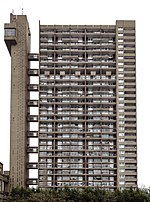Thameside Radio
Thameside Radio was an unlicensed radio station based in London. It launched in the winter of 1977, offering "very slick pop rock with competitions", according to Time Out. According to the Richmond and Twickenham Times, it broadcast from "a certain Notting Hill tower block" – a reference to Trellick Tower.The station received 30-40 letters each week and had an estimated listenership of around 20,000. It pioneered new music, and is noted by the New Musical Express for giving airplay to "Win a Night Out with a Well-Known Paranoiac" by Barry Andrews, which was subsequently picked up by BBC Radio 1.Increasing numbers of raids resulted in the station losing five transmitters in six months and the station ceased live transmission, instead taping its shows shortly before broadcast.Recordings of a number of Thameside Radio shows are held by the British Library. Many shows are available for download from fmthen.com In late 1984, Thameside set up the first London unlicensed TV station for a one-off event.
Excerpt from the Wikipedia article Thameside Radio (License: CC BY-SA 3.0, Authors).Thameside Radio
Golborne Road, London North Kensington (Royal Borough of Kensington and Chelsea)
Geographical coordinates (GPS) Address Nearby Places Show on map
Geographical coordinates (GPS)
| Latitude | Longitude |
|---|---|
| N 51.5237 ° | E -0.2054 ° |
Address
Trellick Tower
Golborne Road
W10 5NW London, North Kensington (Royal Borough of Kensington and Chelsea)
England, United Kingdom
Open on Google Maps






